
Please call or text me to find out about my services.
| CALL or TEXT 609-914-1318 |
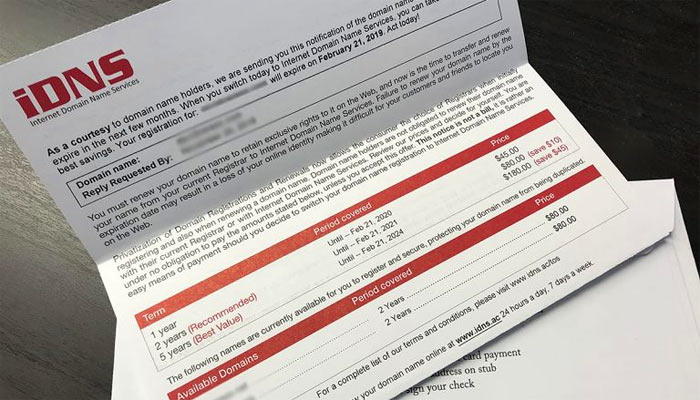
If you've recently registered a new domain name (website address), renewed an existing domain name, or your domain name is coming up for renewal or ready to expire, you may have started receiving emails about your domain name. BE CAREFUL, as some of those emails may be fake. However, you can get these notifications anytime if you have a domain name, not just if it's new or coming up for renewal.
If you get an email that your domain name is coming up for renewal, check with a website like whois.com, where you can enter your domain name and it'll show you when it's expiring and who the domain registrar is (the website where your domain name is currently registered). If the expiration date isn't within the next 4 months, or more importantly, the company that sent the letter isn't the same as the one listed as your current registrar, then the email or phone call you got is most likely a scam.
If you have your domain name registered with GoDaddy, however, your whois information might show the registrar as "Wild West Domains" or "DNH Hosting", as they are subsidiaries of GoDaddy, so in that case it's legit. But if you're unsure, contact your web designer or GoDaddy.
Domain companies do not call customers. You'll never get a legitimate phone call from your domain registrar reminding you that your domain name is coming up for renewal. If you get a call from someone about your domain name, just hang up, as it is ALWAYS a scam. The only exception is if the registrar has been working with you or your web designer to troubleshoot a technical issue, in which case someone from their technical support team might reach out. If so, never give them any account information, even your account PIN code. Tell them that you'll call back and then call back the official phone number for your domain's registrar. Or contact your web designer.
Read any emails you receive about your domain name thoroughly. If it asks you to click on a link or a button, hover over the link first without clicking it. When you hover over a link, the link address appears in the bottom left corner of your browser. Does the link look "suspicious"? Does it include words that have nothing to do with domain names? For instance, I received an email the other day that supposedly came from GoDaddy, but the link address was not godaddy.com; it was an odd address with the word "gameday" in it. Some emails can be trickier and more legitimate sounding though. Your web designer can tell you if the email is legitimate or not.
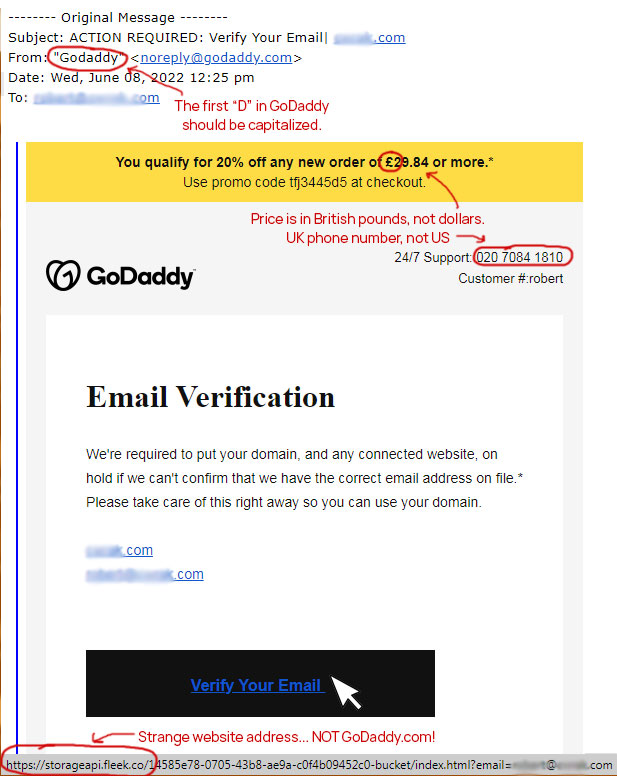
If you click on the link in this email to "Verify Your Email", and enter your email and password into what you think is your actual GoDaddy account (but it's not, even though the website may look legitimate), you've just given the scammers your password. They can go in and hijack your website, transfer your domain name, make charges on the credit card on file, and a lot more.
I clicked on the link and it took me to a website that looked quite a bit like GoDaddy, although of course the website address in the browser address bar was not GoDaddy's. By the time I went back to take a screenshot for this blog, the website was gone and a security warning was in its place.
Sometimes there are little things in these emails that give away the fact that its a scam (but often the email looks perfectly legit). In this case, the company name "Godaddy" in the "from" email was misspelled (the first "D" should be capitalized). The pricing was in British pounds (even though my client is in the U.S.), the support phone number was in the U.K., and of course hovering over the "Verify Your Email" link showed on the bottom left side of my browser screen that the link was going to a weird website address that has nothing to do with GoDaddy.
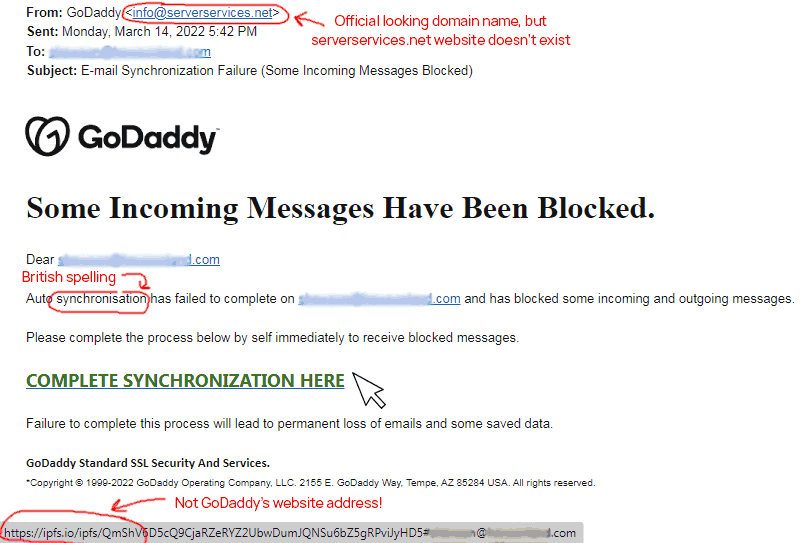
This one is easy to mistake for legitimate because "email synchronization" sounds technical, so it must be important, right? But like the example above, hovering over the "Complete Synchronization" link shows a website address in the lower left corner of the browser that's not GoDaddy. Another login theft scam. There's also a British spelling of a word in the email.
If you get a bill for domain services by regular mail, it is ALWAYS a scam. That's because legitimate domain registrars only send domain notices by email, never by regular mail or phone calls. In fact, many of these "invoices" actually say in the middle of the page that it's a "solicitation, and not a bill", but they know that nobody ever reads the "bill"!
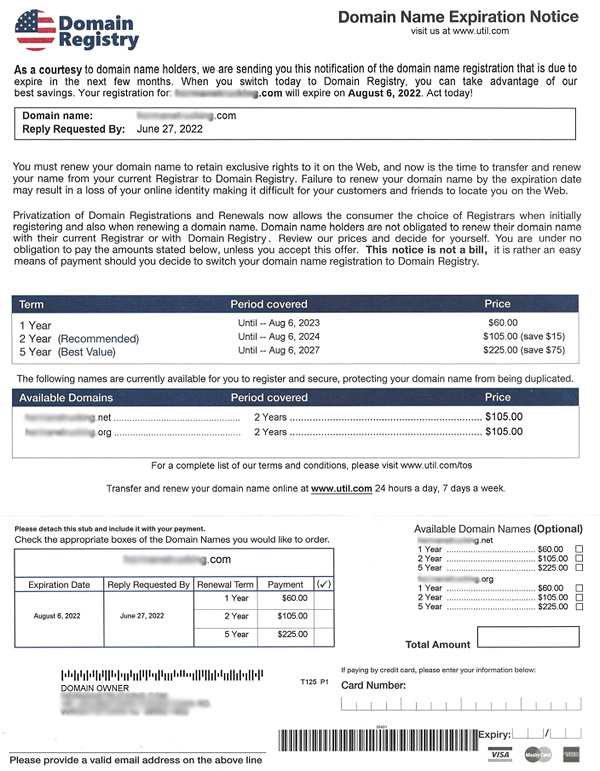
This type of scam is one of the oldest, and has been around since the 1990s. The scammer sends these official looking letters out to companies whose domain names are coming up for renewal, or even just anyone who has a domain name. What they don't tell you is that they are NOT your current domain registrar. They just want you to transfer your domain to their company, where they will charge you double, sometimes triple, what your current registrar is charging. Sometimes these scammers are indeed "real" domain registrars that just charge exorbitantly overpriced fees, sometimes they're not and they just want to steal your domain name, or they're credit card thieves. This particular company does have a website that provides domain services, but their Terms of Service are concerning; for instance, if your account gets hacked, you have to pay them $50 per hour to investigate and get your domain name back! So more than likely your account will indeed end up getting hacked... by their own people!
The reason why these types of domain name scams are so successful is that nobody ever reads them, particularly the ones (the majority of them) that say, in bold writing, "This notice is not a bill" or "This is a solicitation" or "You are under no obligation". Since they disclose that in plain sight, technically what they're doing is not illegal. It's highly unethical, but if you pay to switch your domain name to them without reading the fine print, that's on you.
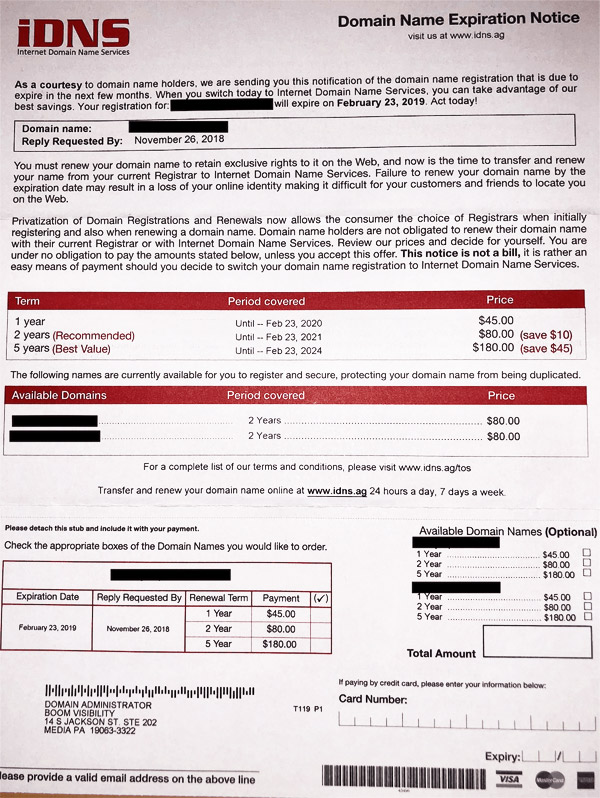
Another one like the one above it, but a different "company". Although more than likely it's the same racket with a different name. All people read is, "You must renew your domain name to retain exclusive rights to it", but they don't go any further. Again, this one does say that "This notice is not a bill.
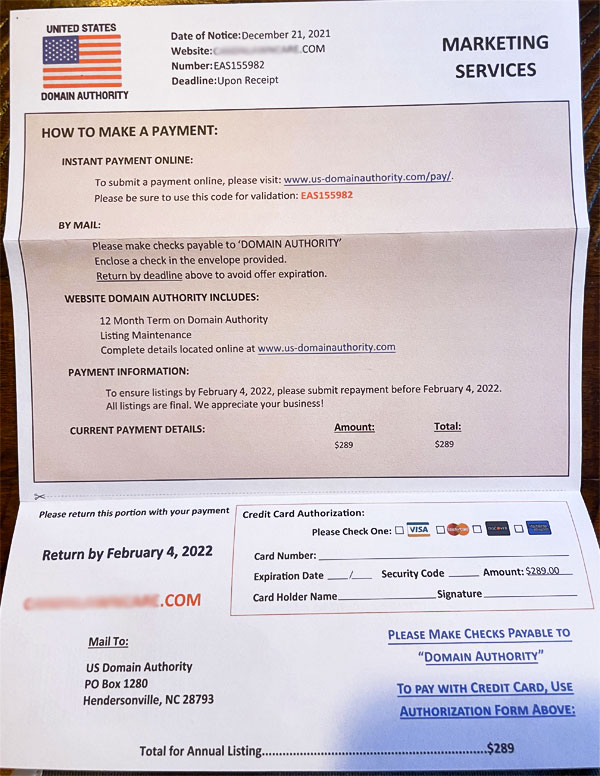
And yet another one, but this one is for "Marketing Services", and it's and quite vague. It doesn't mention anything about the domain name, just says the $289 price includes "12 Month Term on Domain Authority". Apparently it's to list your company on that website, but it doesn't give any other information. The date of the letter is December 21, 2021, but as of June 17, 2022, the website address shown in the letter, www.us-domainauthority.com, doesn't exist (so much for your 12-month term!) According to whois.com, the domain itself does exist, and was registered in November 2021 (just in time for their spam letter campaign!), in the country "KN" (an island area in the West Indies called Saint Kitts and Nevis).
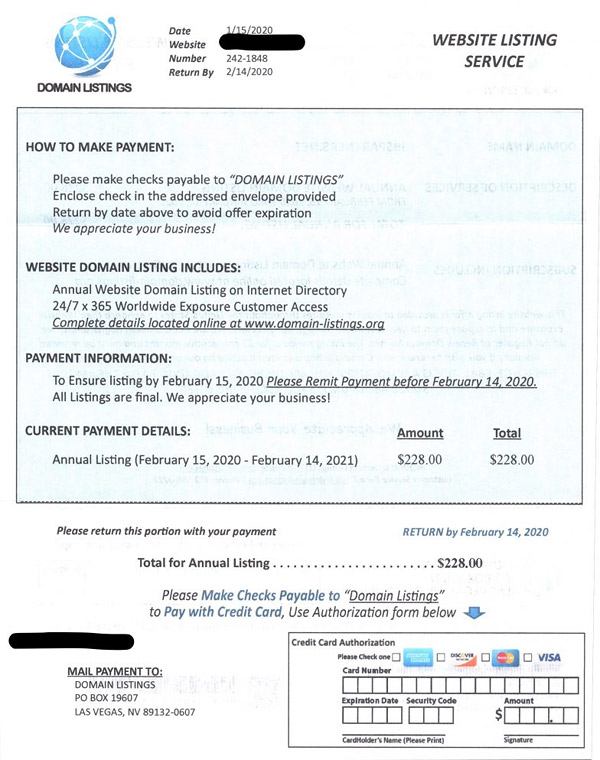
This one is for "Website Listing Service", and the writing and dollar amount suggests that even though the "company" name is different, it's probably the same outfit as the scammer above. The official sounding company name, "Domain Listings", makes you think this has something to do with your domain name, so it must be important. This "company", unlike the other one, does have a website, at www.domain-listings.org (which forwards to https://domainlistings.directory), which does look legitimate on the surface, but it's actually not. If you get your company listed on this website, nobody will ever see your listing unless they visit the website directly (which they will never do, because it's not listed anywhere else). Only the home page of this website is in Google search results (which you can see when you do a search for site:domain-listings.org on Google). That means all the other pages, including any company listings, are hidden (most likely blacklisted) from Google Search.
Why would this company go through the trouble of putting up such a professional looking website that does include listings for companies (probably all of which fell for this scam)? Because when you visit the website, it looks perfectly legitimate! So although this is indeed a scam, it's not illegal, because the company is doing what you're paying them do do, add you to their listing website. There's nothing on the invoice that guarantees that your listing or their website will get found by Google or anyone else.
Why would you pay $228.00 to get listed on an obscure website that nobody will ever see, when you can get added to Google My Business (the most important listing site) for free, as well as other high-ranking, reputable websites that do get indexed by Google?
It's simple... MONEY! In the email I received, I was told that the official-sounding company "DomainServices.org" would submit my domain name to the top search engines for only $97 after a $300 coupon discount. All I had to do is enter my credit card information. If you fall for this scam, at the least, you'll be throwing money away because "search engine submission" hasn't been a valid service since 2005! But the more likely scenario is that you'll end up a victim of credit card fraud.
How can you protect yourself against these kinds of scams? You can pay for "Full Domain Privacy & Protection" for your domain name through your domain registrar. This hides your public information in public "whois" listings that scammers frequently use. Your web designer can set this up for you. But the best way to protect yourself against these scams, and all scams in general, is to be aware, read emails in detail, hover over the link, don't provide your contact information or credit card number through links in unsolicited emails, don't provide any information to someone who calls you about your domain name, and throw away any "bills" you get about your domain name from regular mail.
If you're still not sure if that email is legitimate or not, forward it to your web designer and they can tell you right away if it's legit or not.
Closely related to domain name and listing service scams are Google search engine submission, business listings and website scams. Read my blog about these scams.

|
CONTACT ME
|
HOURS 7 Days/Week
8:00am-6:00pm |
PAYMENTS
|
CONNECT
|
